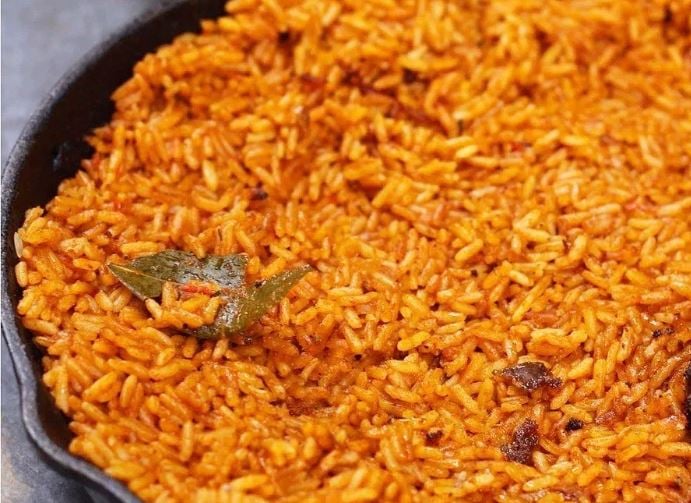It began as a joke borne out of neighbourly, if not filial, rivalry; and went on to elucidate one of the strongest connections between food and destination. While also revealing the continuum of taste and flavours, artificially demarcated by the colonial adventure. Our jollof rice is better than yours! What a sassy way to incite desire, draw international attention to locations – whether Nigeria, Ghana, Sierra Leone, Cameroon or Senegal – and the need for journeys to experience the varied contours of this epic culinary duel. Naturally, after years of contestation, Nigeria inevitably won – over and again – the ‘Jollof wars’, with its unique, tangy, and often wood-smoke flavoured iteration of what has become a national gastronomic pride.
Possibly, the jollof rice – even if its origins were retraced to the Senegalese Thiebou Dienne, Gambian Benachin or any such claimant to ancestry – is Nigeria’s most prominent culinary offering and export, which is as much a signifier of identity, as it is a rallying point of community – from Durban to London and New York. Locate Nigerians anywhere in the world and one of the experiences of the homeland they will lead you to has to involve the jollof rice! More so, it always invokes that craving for its original expression – how it is made at home for the typical Nigerian party or feast.
The attraction garnered by the huge hit of the Nigerian jollof rice was considerable enough to draw the British celebrity chef, Jamie Oliver, into a major controversy a while back in his experimentation with the cuisine to which he introduced certain Western-inspired gourmet twists that unfortunately did not go down well with the ‘owners’ of the food. This drew the ire of many Nigerians, both on the native soil and the diaspora who did a not-so-friendly pushback of what they considered a disrespectful act of cultural appropriation.
Yet, the essential story of food and human civilisation is basically one of the journeys, cultural interactions and, certainly, appropriations. Food has been the raison d’être for travel since the dawn of creation, as the most fundamental of human needs. It has engaged human activity from the earliest period when humans were hunter-gatherers picking from nature – wild berries and other fruits, etc – to the more organised journeys to hunt small animals for sustenance.
Advertisement
Evolving from these were the neighbouring and then farther journeys to get different varieties of food crops that subsequently became domesticated in the ‘primary’ locations. Food and the journeys to seek it in its various forms led to voyages of discovery – of new lands and then exotic spices, utilised as flavouring and for medicinal purposes. Hence, some of the early journeys around food led to the creation of trade routes, from the Mediterranean corridor and the Middle East to the Greco-Roman world and then Eastern Africa, etc., in the search for spices. Prominent among these primal trade routes was the Silk Road, linking the orient to the occident, from South-East Asia to India, Sri Lanka and Europe.
Much of the spices sought after like cinnamon, nutmeg, turmeric, star anise, cardamom, pepper, and ginger, among others, were later moved around by Persian and Indian traders, in some of the earliest instances of what has now become increasingly designated as ‘food tourism’. This equally involved trade that drove much of the world economy then, from the Middle Ages into the Renaissance period and beyond, and contributed substantially to the gastronomic heritage of the world.
Following the trail of flavours – across seas
Advertisement
Presently, food has evolved into a major motive for destination travel and a critical aspect of the tourist experience, as encapsulated in the notion of food tourism, which is also described in other parlance as ‘gastronomic tourism’, ‘culinary tourism’ or gourmet tourism’. This has become highly evident in the vast extent of tourist journeys to locations holding special food appeals, in manners that equally connect with the experiencing of local cultures and traditions. More so, this is largely manifest in the volumes of visitors’ spending on food and its related activities, considered as up to 40% of total travel expenditures.
Taken as a niche market that has grown into a significant area of economic activity, it is documented that food tourism generated as much as $1,116.7 billion globally in 2019, with a projection of reaching up to $1,796.5 billion by 2027, at a compound annual growth rate (CAGR) of 16.8% between 2020 and 2027. And this had been in spite of the disruption of the coronavirus to the travel and food industries. The Asia-Pacific region is noted as having had about 40% of the market share of food tourism in 2019.
In addition, food tourism in Europe is regarded as constituting about 35% of the global market, followed closely by North America, then South America, the Middle East, and Africa. While there are estimates that some 77% of millennials engage in destination travels for memorable experiences of food tourism, it is also pointed out that from 2017, there has been more than a 60% year-on-year upsurge in the spending by travellers on food and its interconnected endeavours.
The gamut of activities now described together as food tourism not only comprises culinary festivals centred around the diversity of cuisines but also visits to food events, restaurants, speciality food stores, wine tours, cookery classes, etc. Some of the more remarkable destinations across the world for the experiencing of food and wine – alongside other beverages, which have now become highly branded spaces of desire, include locations that host festivals such as Oktoberfest in Munich, Germany; Pizzafest in Italy; Wildfoods festival in New Zealand; Tulum Taste of Mexico; the Tokyo Ramen Show; Salon du Chocolat in France; and the New Orleans Wine and Food Experience, etc.
Advertisement
Nigeria’s millennium of the palate
As presently constituted from diverse inflows through time, Nigeria has become an unfolding world of a thousand cuisines, put together by the ingenuity of the diverse groups of people that have come to call its territory home – from the Sahel to the rain forests, and savannah. And, the offerings from each of the groups tell the story of their worldviews and civilisations, which many times encompass chronicles of travels, interfaces, wars, then conquests and dominations, over the past centuries, if not millennium.
More importantly, the growth of urban centres and how all the culinary forms and civilisation have flowed into major cities with the movement of people has inspired desires in the directions of reverse journeys to experience the origins of many of these cuisines.
In the past five decades, beyond the huge appeal of Nigerian food to international audiences, who have continuously sought it out in international visits, one of the greatest enablers of local food tourism has been the National Youth Service Corps (NYSC) programme of the federal government, which remains one of the largest rallies of the country’s youth towards a sense of community. This has inspired desire in generations, which keeps motivating destination travels for the experience of food, drinks and the cultures that give life to these.
Advertisement
Touring through the flavours of Nigeria
When I resumed work at the Nigerian Tourism Development Corporation (NTDC) as the director-general, one of the strategies I had immediately put in place to grow Nigerian tourism was built around domestic tourism through the programme set described as Tour Nigeria. This was in recognition of what I considered as a significant growth path for the Nigerian economy, as a way of creating jobs and driving the consumption of Nigerian goods and services, beyond international tourist inflows.
Advertisement
A subset of this programme has been the campaign on promoting Nigerian flavours by creating awareness around these and exhibiting the culinary assets of our country, not just as a platform for showcasing nostalgia but more saliently as an opportunity for creating backwards and forward linkages between the various operators in the Nigerian food industry, towards enhancing a more virile economy.
Interestingly, in the fallout of the coronavirus pandemic and the concerted efforts at global economic recovery, the United Nations World Tourism Organisation (UNWTO) has projected the insight that domestic tourism is positioned to make as much as a 40% input towards economic recovery across the world. I particularly find this as a remarkable affirmation of the efforts we have made in the past five years to expand the possibilities around Nigerian domestic tourism, of which the Nigeria Flavours festivals are a vital part.
Advertisement
Nigerian Flavours is an avenue to showcase the diversity of the country’s rich cultural heritage through its cuisine and general gastronomic experiences. It is a soft derivative of “Tour Nigeria’’, which is NTDC’s master brand that encourages Nigerians and people from other climes to undertake a tour of the country and experience its rich flavours, by consuming Nigeria’s tourism assets and products.
In this regard, we have hosted three editions of the Nigerian Flavours festivals between 2017 and 2021 in different locations across the country, from Lagos to Abuja and Calabar. It’s a fiesta of food and entertainment that is connecting essential industry stakeholders and unlocking economic opportunities along the culinary value chain, while driven by the farm to plate ambition of facilitating linkages across agricultural supply chains, markets and consumers.
Advertisement
As the Nigerian Flavours programme evolves, this is also in view of giving a fillip to expositions around the country’s various traditional food and related festivals – from the New Yam festival of southeastern Nigeria to others like the Argungu Fishing festival in the north. And, equally, the private sector-driven efforts like the GTBank’s Food & Drink Festival, Sterling Bank’s EatDrink Festival, the Chef Dish Food Festival, etc. There is no doubt that the cumulative impact of these analogous efforts will expand the course of food tourism in Nigeria while unlocking the huge economic potentials around it.
Coker, the Baba Eto of Yorubaland and director-general of the Nigerian Tourism Development Corporation, is the chief marketer of Nigerian destination.
Views expressed by contributors are strictly personal and not of TheCable.
Add a comment







